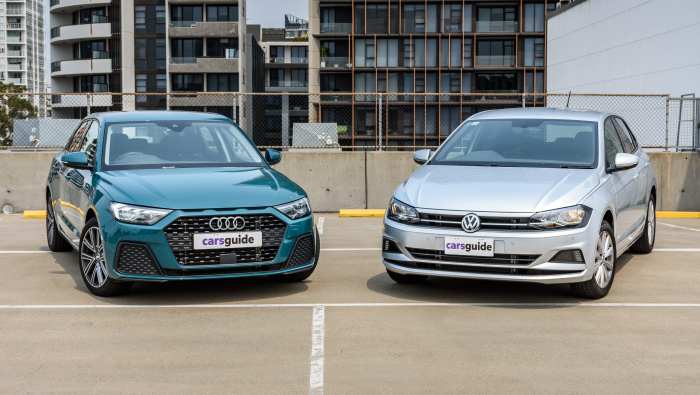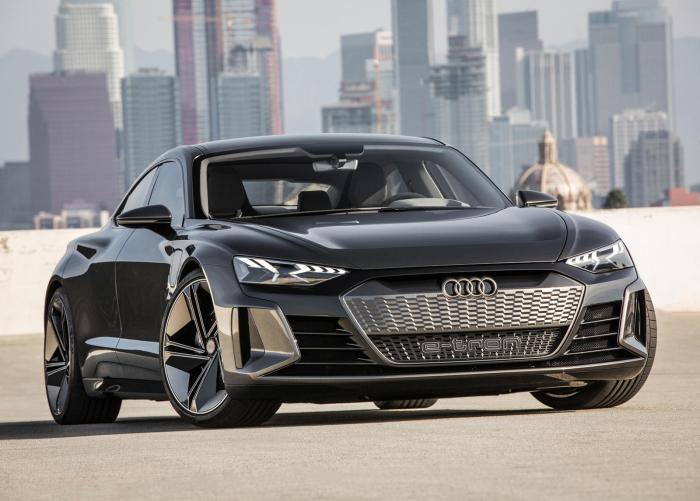Does Volkswagen make Audi? This question sparks curiosity in the automotive realm, where Volkswagen and Audi stand as prominent players. Embark on a journey to unravel the intricate relationship between these two German giants, exploring their shared history, distinct identities, and global presence.
Volkswagen, renowned for its iconic Beetle and practical vehicles, has a long-standing presence in the automotive industry. Audi, on the other hand, has established itself as a symbol of luxury and performance. Together, they form a formidable alliance that has shaped the automotive landscape.
Volkswagen and Audi History
Volkswagen and Audi, two iconic German automakers, share a rich and intertwined history. Both companies have played a significant role in shaping the automotive industry, from the iconic Volkswagen Beetle to the luxurious Audi A8.
Volkswagen’s origins date back to 1937, when the German government commissioned Ferdinand Porsche to design a “people’s car,” the Volkswagen Beetle. Audi, on the other hand, traces its roots to 1899, when August Horch founded Horch & Cie. in Zwickau, Germany.
Mergers and Acquisitions
Over the years, Volkswagen and Audi have undergone several mergers and acquisitions. In 1964, Volkswagen acquired Auto Union, which owned the Audi, DKW, Horch, and Wanderer brands. This acquisition marked the beginning of Volkswagen’s expansion into the luxury car market.
In 1969, Volkswagen merged with NSU Motorenwerke, another German automaker. This merger further strengthened Volkswagen’s position in the automotive industry and allowed it to offer a wider range of vehicles.
Ownership and Shared Resources
Today, Volkswagen owns 100% of Audi. The two companies share many resources, including production facilities, engineering expertise, and technology. This collaboration has allowed both Volkswagen and Audi to develop and produce high-quality vehicles that meet the demands of the global market.
Product Comparison
Volkswagen and Audi offer a diverse range of vehicles catering to different market segments. While both brands share some similarities, there are also distinct differences in their product lines.
Volkswagen’s lineup consists of a wide range of affordable and practical vehicles, including the compact Golf, the midsize Passat, and the spacious Tiguan SUV. Volkswagen vehicles are known for their reliability, fuel efficiency, and value for money.
Audi, on the other hand, focuses on producing luxury vehicles with a sporty and sophisticated design. Audi’s lineup includes sedans like the A4 and A6, SUVs like the Q3 and Q5, and sports cars like the TT and R8. Audi vehicles are known for their high performance, advanced technology, and premium materials.
The question of whether Volkswagen makes Audi is closely related to the issue of whether Volkswagens have radiators. Volkswagen, the parent company of Audi, is a German automotive giant known for producing reliable and fuel-efficient vehicles. While the two brands share some similarities, they also have distinct characteristics.
For instance, do Volkswagens have radiators ? Yes, they do, just like Audis. Understanding the differences between these two car brands can help you make an informed decision when choosing your next vehicle.
Pricing, Does volkswagen make audi
Volkswagen vehicles are generally more affordable than Audi vehicles. The base price of a Volkswagen Golf starts around $25,000, while the base price of an Audi A4 starts around $40,000. However, both brands offer a range of models with different features and options, so the price can vary significantly depending on the specific configuration.
Target Market
Volkswagen targets a wide range of customers, including families, young professionals, and budget-conscious buyers. Audi, on the other hand, targets a more affluent and discerning customer base who value luxury, performance, and exclusivity.
Volkswagen is the parent company of Audi, so if you’re curious about the reliability of Volkswagen vehicles, you might also be interested in knowing if are volkswagen beetles reliable . The Volkswagen Beetle is a classic car that has been around for decades, and it has a reputation for being reliable and fun to drive.
If you’re considering buying a Volkswagen, the Beetle is a great option to consider.
Brand Identity
Volkswagen and Audi, two German automotive giants, possess distinct brand identities that reflect their unique market positions and customer perceptions. Both brands have evolved over the years, refining their logos, marketing campaigns, and overall image to cater to specific target audiences.
Volkswagen has been producing Audi vehicles since the 1960s, but did you know that they stopped making the iconic Beetle in 2019? Click here to learn more about the discontinuation of the beloved Beetle. Despite this, Volkswagen continues to manufacture a wide range of Audi models, showcasing their commitment to luxury and performance.
Volkswagen, known for its mass-market appeal, has traditionally projected a friendly and approachable brand identity. Its iconic logo, featuring a stylized “VW” emblem, evokes a sense of reliability and value for money. Volkswagen’s marketing campaigns often emphasize the practicality and affordability of its vehicles, targeting families and budget-conscious consumers.
Brand Differentiation
In contrast, Audi has cultivated a more premium and sophisticated brand image. Its four interlocking rings logo symbolizes the merger of four automotive companies in the early 20th century. Audi’s marketing campaigns focus on performance, innovation, and luxury, appealing to discerning customers who seek a higher level of refinement and exclusivity.
Global Presence

Volkswagen and Audi, two of the most prominent automotive brands globally, have established a substantial presence across the world. Their manufacturing facilities, sales networks, and market share reflect their success in different regions.
Volkswagen and Audi share a common history, with Volkswagen acquiring Audi in the 1960s. While Audi is now a separate brand, it still benefits from Volkswagen’s engineering and manufacturing expertise. This has led to questions about the longevity of Volkswagens, with some people wondering if they last as long as Audis.
To find out more about the durability of Volkswagens, check out this article: do Volkswagens last long . It provides insights into the factors that affect a Volkswagen’s lifespan and offers tips on how to extend its longevity.
Volkswagen, with its headquarters in Wolfsburg, Germany, operates manufacturing plants in 14 countries, including China, Mexico, and Brazil. Its sales network spans over 150 countries, with a strong presence in Europe, North America, and South America.
Factors Contributing to Success
- Brand Recognition:Volkswagen and Audi have built strong brand reputations for reliability, quality, and innovation, which has contributed to their global appeal.
- Product Range:Both brands offer a diverse range of vehicles, from compact cars to luxury SUVs, catering to different customer needs and preferences.
- Localization:Volkswagen and Audi have adapted their products and marketing strategies to meet the specific demands of local markets, enhancing their appeal and sales.
- Partnerships and Acquisitions:Strategic partnerships and acquisitions have allowed Volkswagen and Audi to expand their global reach and access new markets.
- Government Support:In some regions, government policies and incentives have supported the growth of Volkswagen and Audi, particularly in emerging markets.
Audi, a subsidiary of Volkswagen, has a more focused global presence compared to its parent company. With manufacturing facilities in Germany, Hungary, and Mexico, Audi primarily targets premium and luxury car segments. Its sales network is concentrated in Europe, North America, and China, where it has a strong market share.
Did you know that Volkswagen owns Audi? Volkswagen is a German automaker that produces a wide range of vehicles, including cars, SUVs, and trucks. Audi is a luxury car manufacturer that is also owned by Volkswagen. In fact, Volkswagen discontinued the Beetle in 2019, but you can still find used Beetles for sale.
Did Volkswagen Discontinue the Beetle ? Yes, they did. However, Volkswagen still makes a variety of other popular vehicles, such as the Golf, Jetta, and Passat.
Market Share
Volkswagen consistently ranks among the top automotive manufacturers globally in terms of sales volume. In 2022, it sold over 8.3 million vehicles worldwide, with a market share of around 6.2%. Audi, on the other hand, sold over 1.6 million vehicles in the same year, capturing a market share of approximately 1.2% in the global luxury car segment.
Both Volkswagen and Audi continue to expand their global presence through new investments, partnerships, and product launches, aiming to maintain and grow their market share in different regions around the world.
Future Outlook

Volkswagen and Audi, as leading automotive manufacturers, are constantly striving to stay ahead of the curve in the ever-evolving automotive industry. They have ambitious plans for the future, focusing on product development, technological advancements, and strategic market positioning to maintain their competitive edge.
Volkswagen aims to strengthen its position as a global mobility provider, offering a wide range of vehicles from affordable and efficient models to high-performance and premium options. The company is investing heavily in electric vehicles (EVs) and plans to launch a comprehensive range of EVs across its brands, including Volkswagen, Audi, SEAT, and Škoda.
Audi, on the other hand, is focusing on becoming a leader in the premium electric vehicle segment. The brand is committed to offering a fully electric lineup by 2026 and plans to introduce several new EV models in the coming years.
Audi is also investing in autonomous driving technologies and plans to launch Level 3 autonomous vehicles by 2025.
Challenges and Opportunities
The automotive industry is facing a number of challenges, including the rising popularity of EVs, increasing competition from new entrants, and the need to reduce emissions. Volkswagen and Audi are well-positioned to address these challenges with their strong brand portfolios, technological expertise, and global reach.
Volkswagen and Audi are also facing opportunities for growth in emerging markets, such as China and India. These markets are experiencing rapid growth in demand for vehicles, and Volkswagen and Audi are well-positioned to capitalize on this growth with their affordable and premium offerings, respectively.
Overall, Volkswagen and Audi have a bright future ahead of them. They are well-positioned to address the challenges and opportunities facing the automotive industry, and they have ambitious plans for product development, technological advancements, and market strategies. It will be interesting to see how these two brands continue to evolve and shape the future of the automotive industry.
Last Point: Does Volkswagen Make Audi
The connection between Volkswagen and Audi extends beyond ownership and shared resources. It’s a testament to their ability to cater to diverse market segments, from value-conscious consumers to discerning luxury enthusiasts. As the automotive industry continues to evolve, Volkswagen and Audi are poised to remain at the forefront, shaping the future of mobility with their combined expertise and innovation.